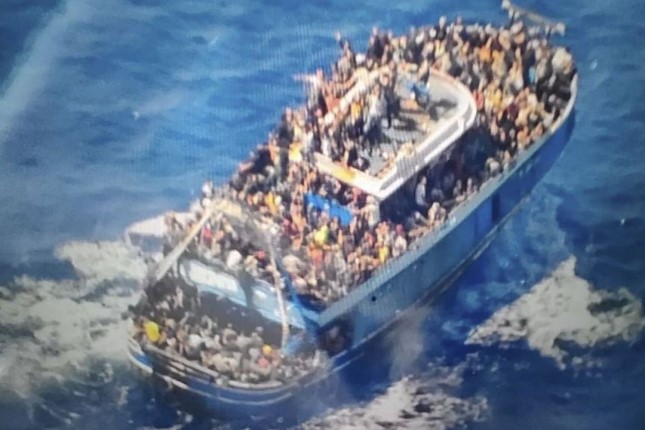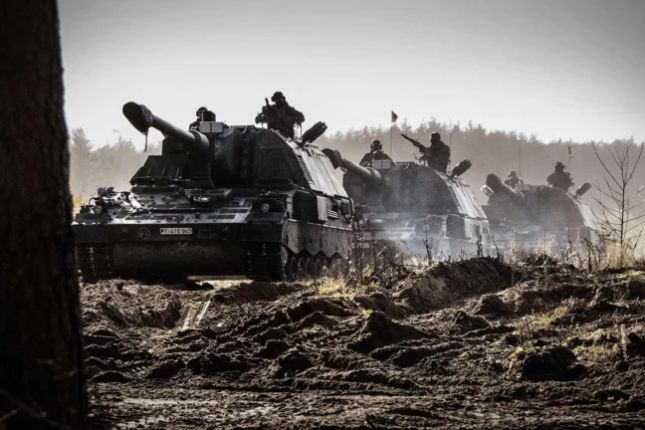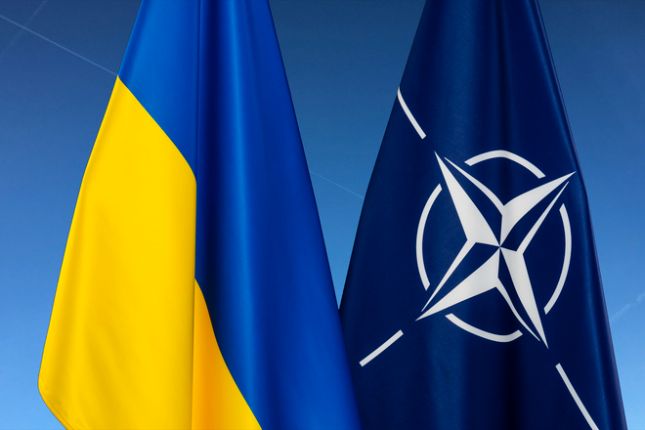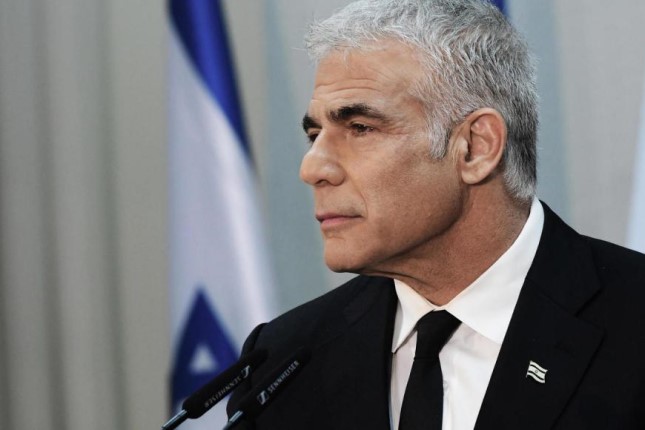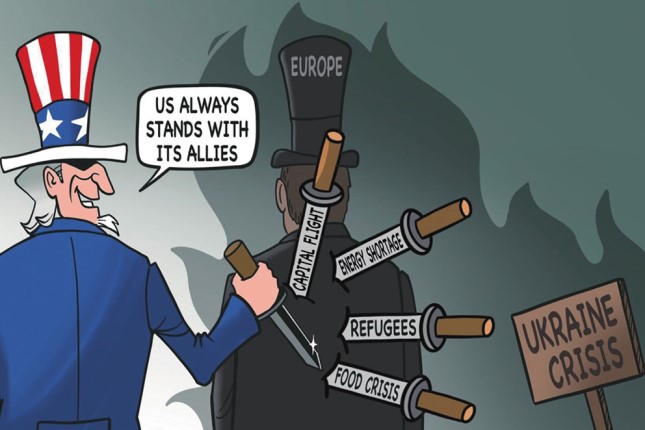What was described as a vastly overcrowded 20-30 metre fishing vessel sank in the early hours of Wednesday. By early afternoon the death tally had already reached 79 in by far the worst mass fatality incident off Greece’s Mediterranean coast this year.
According to a Greek official cited by the Guardian Wednesday, “There has been a dramatic rise in the death count, which is climbing by the hour… Speculation is rife that as many as 600 people were onboard but that has not been confirmed. The ship is under the water. It has sunk.”
Just 104 have been rescued so far and that as many as 750 could have been onboard when the vessel sank around 50 miles (80 km) south-west of Pylos. It is reported than many women and children were in the ship’s hold, with the Financial Times noting, “Survivors said more than 100 children were in the ship’s hold.”
The deaths occurred less than two weeks before the second round of Greece’s general elections on June 25 forcing New Democracy Prime Minister Mitsotakis; the main opposition Syriza’s Alexis Tsipras; and other party leaders to suspend campaigning. Three days of national mourning were declared. The election had already been suspended previously for around a month as a result of mass protests and strikes in opposition to February’s preventable train crash deaths in the Tempi valley.
The vessel set off from the eastern Libyan port of Tobruk destined for Italy and sank off Greece’s southern Peloponnese coast. Reports said people from Afghanistan and Pakistan, Syria and Egypt were on board.
Greek state broadcaster ERT reported, “Twenty-six people are hospitalized in the Kalamata hospital with minor injuries or hypothermia, they are all men, young and middle-aged. Seventy-eight people are in the premises of the Coast Guard and tomorrow (15/6) they will be transferred to a hospitality structure in Malakasa.”
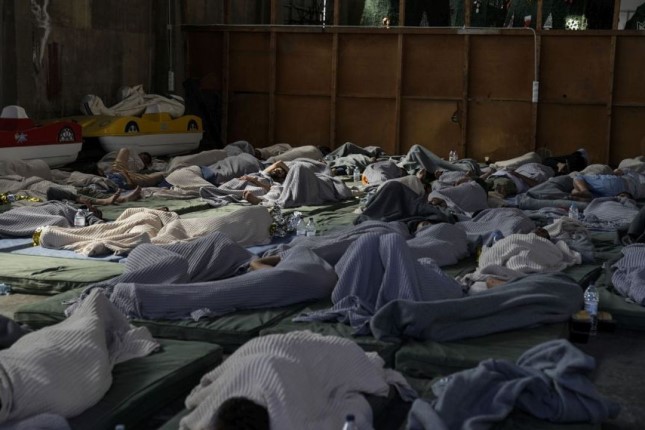
Survivors of a shipwreck sleep at a warehouse at the port in Kalamata town, about 240 kilometers (150 miles) southwest of Athens, Wednesday, June 14, 2023. A fishing boat carrying migrants capsized and sank off the coast of Greece on Wednesday, authorities said, leaving at least 79 people dead and many feared missing in one of the worst disasters of its kind this year. Photo: AP Photo / Thanassis Stavrakis.
The Guardian wrote of “unprecedented scenes in Kalamata, the Peloponnesian town where the dead and injured were being taken. Coastguard vessels, a navy frigate, military transport planes, an air force helicopter and an array of private craft were participating in the search for survivors. Rescue efforts were initially hampered by strong winds.”
Kathimerini cited Ioannis Zafiropoulos, Kalamata’s deputy mayor, who said he understood that there were “more than 500 people” on board.
No-one can take at face value the account of the situation being provided by the European Union border agency Frontex and the Greek coastguard, as evidence emerges that the ship was treated with hostility and allowed to sink. Frontex issued a self-serving 89-word statement Wednesday declaring, “Frontex surveillance aircraft had detected the boat on Tuesday, 13 June at 09:47 UTC and immediately informed the competent Greek and Italian authorities. All questions should be directed to the Greek Rescue Coordination Centre.”
Media reports cited the coastguard saying that they were told by those on board that they did not require assistance. Reuters reported, “Late on Tuesday, a few hours before the boat capsized, the boat's occupants refused an offer of help, insisting on continuing their journey, the coast guard said.” Those on deck “refused assistance and stated their desire to continue their voyage,” said the coastguard.
It was left to Alarm Phone, staffed by volunteers who provide a hotline for people on boats in distress, to provide an account of what happened. The group published a timeline and accompanying article Wednesday, “Europe’s ‘shield’: Hundreds presumed to have drowned off Greece”. It stated, “Yesterday, 13 June 2023, we had alerted the Hellenic Coast Guard at 16:53 CEST [Central European Summer Time] to this boat in distress, as the people had called us for help. The Greek authorities, reportedly also Italy and Malta, had already been alerted several hours earlier. Greek and other European authorities were thus well aware of this overcrowded and unseaworthy vessel. A rescue operation was not launched. In the early hours of today, 14 June 2023, the boat capsized.
“Already in the hours following this disaster at sea, the Hellenic Coast Guard has begun to justify their failure to assist by arguing that the people in distress had not wanted to be rescued to Greece.”
Alarm Phone responded, “We ask: Why are people at sea so afraid to encounter Greek forces?... It is because people on the move know about the horrible and systematic pushback practices carried out by the Greek authorities, practices that are sanctioned by the EU. Greece has become ‘Europe’s shield’, as European Commission president von der Leyen once noted, violently deterring people on the move.” (emphasis in original)
The piece noted that refugees “know that thousands have been shot at, beaten, and abandoned at sea by these Greek forces. They know that encountering the Hellenic Coast Guard, the Hellenic Police or the Hellenic Border Guards often means violence and suffering. It is due to systematic pushbacks that boats are trying to avoid Greece, navigating much longer routes, and risking lives at sea.”
The timeline notes:
“In the morning of 13 June, from 9:35h CEST, the Twitter user Nawal Soufi alerts about a large boat in distress, carrying, according to them, 750 people. Over the following hours, Nawal Soufi adds further information, including the GPS position of the boat in distress and that authorities in Italy, Greece, and Malta have been alerted.
“14:17 CEST: Alarm Phone receives the first call from the boat in distress. It is difficult to communicate with the distressed. They say that they cannot survive the night, that they are in heavy distress. Alarm Phone tries to receive their current GPS coordinates in order to be able to alert authorities – but the call cuts. We try to reconnect with them.
“16:53 CEST: We alert the Greek authorities per email as well as other actors, including Frontex and UNHCR Greece.
“17:20 CEST: We speak to the distressed and they report that the boat is not moving. They say: ‘The captain left on a small boat. Please, any solution.’ They say they need food and water.
“17:34 CEST: We receive another call from the boat in distress and their updated position: 36 18, 21 04 – very close to the previous position. They say that the boat is overcrowded and that the boat is moving from side to side.
“18:00 CEST: We call the company of the merchant vessel ‘Lucky Sailor’, informing them about the boat in distress. They say that they only act under the authority of the Greek coastguards.”
Two hours later at “20:05 CEST: Alarm Phone is informed by the distressed that they received water from the merchant vessel Lucky Sailor and that they have been in contact with the ‘police’. Alarm Phone also notices that a second merchant vessel, the ‘Faithful Warrior’, is close to the distressed.”
The timeline ends: “00:46 CEST on 14/06/2023: Last contact to the boat in distress. All we hear is: ‘Hello my friend… The ship you send is …’. The call cuts.”
Many more refugee deaths could have occurred even during the same day, as a boat with more than 80 migrants had to be rescued and towed to a port in southern Crete.
After every mass death of refugees in the Mediterranean—over 20,000 have died since 2014—governments and political leaders, alongside the EU, shed crocodile tears and “are deeply moved by the tragic events” (Frontex). But the deaths are the inevitable result of brutal anti-immigration policies. So far this year, nearly 1,000 people have died in the Mediterranean, the latest victims of Fortress Europea policy funded by vast resources to prevent refugees from escaping their war torn and poverty stricken countries.
In July, the European Court of Human Rights (ECHR) ruled that Greece acted unlawfully in failing to protect refugees who perished in an Aegean Sea mass drowning that killed 11 people. The 16 survivors—13 Afghans, two Syrian nationals and a Palestinian national—said the Greek coastguard sank the boat when attempting to tow it at speed towards Turkey. The ECHR found that Greek officials unlawfully subjected 12 of the survivors to degrading treatment by strip-searching them when they reached land. The authorities then failed to carry out an effective investigation into the circumstances in which the boat had sunk.
The pseudo-left Syriza played a major role in enforcing this brutal policy during its years in power (2015-19). Its anti-immigration agenda, including implementing the “pushback” policy as part of the deal between the EU and Turkey, is documented by the WSWS here.
The deepening crisis of the capitalist system is creating millions more refugees each year. Last year the UN High Commissioner for Refugees (UNHCR), put the number of people forcefully displaced at more than 100 million. On Tuesday the UNHCR announced that, fuelled by the wars in Ukraine, Somalia, Sudan and elsewhere, the number had soared to a new record, 110 million people—more than one person in every 74 on the planet.
Main photo: A handout image provided by Greece's coast guard on Wednesday, June 14, 2023, shows scores of people covering practically every free stretch of deck on a battered fishing boat that later capsized and sank off southern Greece. A fishing boat carrying migrants trying to reach Europe capsized and sank off Greece on Wednesday, authorities said, leaving at least 79 dead and many more missing in one of the worst disasters of its kind this year © AP Photo / Hellenic Coast Guard via AP.
Source: World Socialist Web Site.
